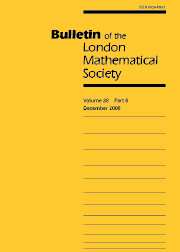Crossref Citations
This article has been cited by the following publications. This list is generated based on data provided by
Crossref.
Lagarias, Jeffrey C.
Reeds, James A.
and
Wang, Yang
2000.
Orthonormal bases of exponentials for the n-cube.
Duke Mathematical Journal,
Vol. 103,
Issue. 1,
Łaba, Izabella
and
Wang, Yang
2002.
On Spectral Cantor Measures.
Journal of Functional Analysis,
Vol. 193,
Issue. 2,
p.
409.
Wang, Yang
2002.
Wavelets, tiling, and spectral sets.
Duke Mathematical Journal,
Vol. 114,
Issue. 1,
Konyagin, Sergei
and
Łaba, Izabella
2003.
Spectra of certain types of polynomials and tiling of integers with translates of finite sets.
Journal of Number Theory,
Vol. 103,
Issue. 2,
p.
267.
Pedersen, Steen
2004.
The dual spectral set conjecture.
Proceedings of the American Mathematical Society,
Vol. 132,
Issue. 7,
p.
2095.
Li, Jian-Lin
2004.
On characterizations of spectra and tilings.
Journal of Functional Analysis,
Vol. 213,
Issue. 1,
p.
31.
Li, Jian-Lin
2004.
On a characterization of spectra and tilings.
Journal of Mathematical Analysis and Applications,
Vol. 289,
Issue. 1,
p.
244.
Li, JianLin
2010.
Duality properties between spectra and tilings.
Science China Mathematics,
Vol. 53,
Issue. 5,
p.
1307.
Bose, Debashish
and
Madan, Shobha
2011.
Spectrum is periodic for n-intervals.
Journal of Functional Analysis,
Vol. 260,
Issue. 1,
p.
308.
Kisielewicz, Andrzej P.
and
Przesławski, Krzysztof
2012.
The Structure of Cube Tilings Under Symmetry Conditions.
Discrete & Computational Geometry,
Vol. 48,
Issue. 3,
p.
777.
Kisielewicz, Andrzej P.
and
Przesławski, Krzysztof
2012.
Rigidity and the chessboard theorem for cube packings.
European Journal of Combinatorics,
Vol. 33,
Issue. 6,
p.
1113.
Ding, Dao-Xin
and
Li, Hai-Xiong
2013.
On Characterizations of Fourier Frames and Tilings.
Journal of Applied Mathematics,
Vol. 2013,
Issue. ,
p.
1.
Iosevich, Alex
and
Kolountzakis, Mihal N.
2013.
Periodicity of the spectrum in dimension one.
Analysis & PDE,
Vol. 6,
Issue. 4,
p.
819.
Kadir, Mamateli
2016.
Spectral sets and tiles on vector space over local fields.
Journal of Mathematical Analysis and Applications,
Vol. 440,
Issue. 1,
p.
240.
Greenfeld, Rachel
and
Lev, Nir
2016.
Spectrality and tiling by cylindric domains.
Journal of Functional Analysis,
Vol. 271,
Issue. 10,
p.
2808.
Kolountzakis, Mihail N.
and
Lev, Nir
2016.
On Non-Periodic Tilings of the Real Line by a Function.
International Mathematics Research Notices,
Vol. 2016,
Issue. 15,
p.
4588.
Fan, Aihua
Fan, Shilei
and
Shi, Ruxi
2016.
Compact open spectral sets in Qp.
Journal of Functional Analysis,
Vol. 271,
Issue. 12,
p.
3628.
Huang, Longxiu
and
Wang, Tao
2017.
On the Number of Neighbors in Normal Tiling.
SIAM Journal on Discrete Mathematics,
Vol. 31,
Issue. 1,
p.
240.
Agora, Elona
Antezana, Jorge
and
Kolountzakis, Mihail N.
2020.
Tiling functions and Gabor orthonormal basis.
Applied and Computational Harmonic Analysis,
Vol. 48,
Issue. 1,
p.
96.
Kolountzakis, Mihail N.
Lev, Nir
and
Matolcsi, Máté
2023.
Spectral sets and weak tiling.
Sampling Theory, Signal Processing, and Data Analysis,
Vol. 21,
Issue. 2,


